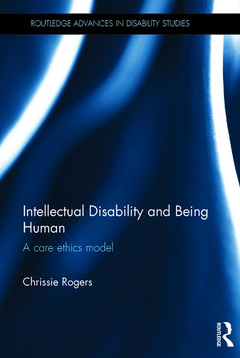Intellectual Disability and Being Human A Care Ethics Model Routledge Advances in Disability Studies Series
Auteur : Rogers Chrissie

Intellectual disability is often overlooked within mainstream disability studies, and theories developed about disability and physical impairment may not always be appropriate when thinking about intellectual (or learning) disability.
This pioneering book, in considering intellectually disabled people's lives, sets out a care ethics model of disability that outlines the emotional caring sphere, where love and care are psycho-socially questioned, the practical caring sphere, where day-to-day care is carried out, and the socio-political caring sphere, where social intolerance and aversion to difficult differences are addressed. It does so by discussing issue-based everyday life, such as family, relationships, media representations and education, in an evocative and creative manner. This book draws from an understanding of how intellectual disability is represented in all forms of media, a feminist ethics of care, and capabilities, as well as other theories, to provide a critique and alternative to the social model of disability as well as illuminate care-less spaces that inhabit all the caring spheres. The first two chapters of the book provide an overview of intellectual disability, the debates surrounding disability, and outline the model. Having begun to develop an innovative theoretical framework for understanding intellectual disability and being human, the book then moves onto empirical and narrative driven issue-based chapters. The following chapters build on the emergent framework and discuss the application of particular theories in three different substantive areas: education, mothering and sexual politics. The concluding remarks draw together the common themes across the applied chapters and link them to the overarching theoretical framework.
An important read for all those studying and researching intellectual or learning disability, this book will be an essential resource in sociology, philosophy, criminology (law), social work, education and nursing in particular.
1. Introduction: Being Human 2. A Care Ethics Model of Disability: Ways of Being Human and Intellectual Disability 3. Re-humanising Education 4. Mothering and (In)Humanity: Care-less Spaces 5. Sexual and Friendship Politics: Considering Relationships 6. Concluding Remarks
Chrissie Rogers joined Aston University as a sociologist in the School of Languages and Social Sciences in September 2012. She graduated from Essex with her PhD (ESRC) in Sociology (2004) and then secured an ESRC post-doctoral fellowship (Cambridge). She subsequently published a monograph Parenting and Inclusive Education. Chrissie has held posts at Keele, Brunel and Anglia Ruskin. Chrissie has published in the areas of mothering, disability, intimacy, and sociology of education. She also completed a small piece of research with young disabled people on relationships, friendships and leisure time. Chrissie co-edited Critical Approaches to Care: with Dr Susie Weller and is editing a special issue for Sexualities on Intellectual Disability and Sexuality. Chrissie is also writing in the area of women in the academy, and co-construction of research with disabled people.
Date de parution : 03-2016
15.6x23.4 cm
Date de parution : 07-2017
15.6x23.4 cm
Thème d’Intellectual Disability and Being Human :
Mots-clés :
Young Man; Care Full Work; ADHD; Attention Deficit Hyperactivity Disorder; Intellectually Disabled; Intellectual Disability Research; Socio-political Sphere; Caring Spheres; Human Suffering; Sara’s Son; School Community Engagement; Tyrion Lannister; Connor’s Death; Glen Ridge; Care Ethics; Breaking Bad; Capabilities Approach; Lb; Education System; Difficult Differences; Love Labouring; Collective Indifference; Feminist Ethics; Privileged Medium; UK News


